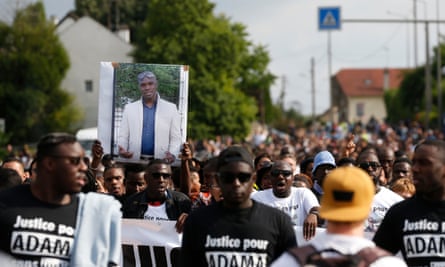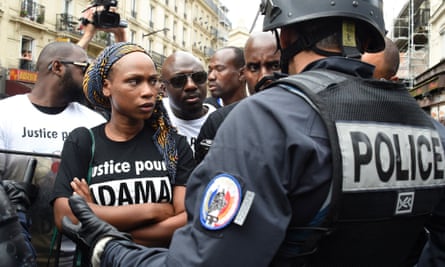One July afternoon last year in Beaumont-sur-Oise, a small town north of Paris, Adama Traoré was out with his older brother, Bagui, planning how to celebrate his 24th birthday that evening when police drove by looking for Bagui in connection with a case. But Adama didn’t have his ID on him and tried to run. Hours later, he was dead in police custody.
The unexplained circumstances of Adama’s death, the allegations of a state cover-up and his family’s fight for justice has made this one of France’s most high-profile cases of alleged police brutality.
The shadow of Traoré’s death has hung over the protests and riots this week on high-rise estates around Paris after another case pushed alleged police violence into the spotlight ahead of this spring’s French presidential election campaign. Amid fury over a violent arrest in Aulnay-sous-Bois in which a police officer was charged with raping a young man, Theo, with a baton, clashes and rioting broke out on estates around Paris leading to over 250 arrests.

Both cases reflect how officers are regularly accused of using excessive force in poorer neighbourhoods, particularly against black and minority ethnic young men.
The president, François Hollande, silent in the Traoré case, appeared at the hospital bedside of the man known as Theo after he had emergency surgery for serious injuries. He hoped to calm unrest, but sporadic clashes have continued on other estates. The far-right Front National’s presidential candidate, Marine Le Pen, who is expected to make it to the final presidential runoff in May, has large electoral support among police and said her principle was to “support the police” unless the justice system proved a crime had taken place.
Benoît Hamon, the Socialist presidential candidate said it could no longer be tolerated that “families fear for their children’s safety if they are stopped by police”.
On 19 July last year, when Adama Traoré’s family heard he had been arrested, they grew increasingly worried. His mother went to the police station and was given conflicting stories. One officer told her that he was in hospital, another said that he was fine and promised to give him the sandwiches that she had prepared for him. Eventually she was told that visiting hours were over and that she had to return the next day.
His mother stood outside the police station with one of her younger sons, Yacouba, crying in the dark. It was 10pm and no one had heard from Adama in over five hours. They watched the flashing lights of police cars drive past them in and out of the station until Yacouba had had enough and put his foot out to hold open the gate.
A police officer told him to move but he refused, demanding news about his brother. The police relented and took them both inside. “If we tell you what has happened, we want you to stay calm,” the police officer told them. “But Adama is dead.”
Yacouba lashed out and had to be restrained. He and his mother were teargassed by the police. Mrs Traoré was told that her son had died of a heart attack and a serious blood infection. They said that he had been drinking and smoking cannabis. “The doctor came and sat next to me and said: ‘Madame, you can’t see your son’,” she told the Guardian. “’He has bled from his nose and mouth, it’s not something you need to see.’”
The next day, as the media started relaying the official version of the story – that a young man had died of a heart attack in police custody – Traoré’s family and friends staged a peaceful protest outside the police station where he had been taken. They didn’t believe that he had died of a heart attack and were looking for answers. Police used teargas to disperse them.
The family’s suspicions grew when the authorities told them: “As you’re Muslim, and we know you like to bury your bodies quickly, we’ve taken the liberty of phoning Roissy [airport] and Air France and the body can be repatriated to Mali tomorrow.” They even offered to arrange passports for any family members who didn’t have them, relatives said. But they weren’t leaving: Adama was not known to have been ill and they wanted a second autopsy.
The authorities again insisted on trying to deliver the body to the family, but the family knew if they accepted it, they wouldn’t be allowed another autopsy. “When the body arrived, in a gesture that felt really violent for us, we refused it,” Traoré’s older sister, Assa, told the Guardian.

The second autopsy revealed Traoré had died of asphyxiation. Toxicology reports for cannabis and alcohol came back negative. The family insisted that someone, somewhere, had lied about what happened that night.
A senior firefighter later told the gendarmerie inquiry that when he arrived to resuscitate Traoré, he found he had not been placed in the recovery position but was lying face-down on the ground in handcuffs, with no one helping him – a statement that contradicted the gendarmes’ accounts. One of the gendarmes said Traoré had told the police he couldn’t breathe, but officers told the firefighter they thought he was faking it. The gendarmes at first refused to un-cuff him saying that he was violent.
Asked about the case in parliament last year, the then interior minister, Bernard Cazeneuve, said only that he supported the police’s work and “couldn’t accept the constant blaming” of officers.
An investigation into the events surrounding Traoré’s death is ongoing. But he was not the first person to die in police custody in France. No official figures are kept on the number of people killed or injured by police or gendarmes, but Amnesty International has warned of what it called “a pattern of de facto impunity” with regard to law enforcement officials in France. Campaign groups and media estimates suggest there are between 10 and 15 deaths a year linked to the police in France.
For decades, riots and social unrest on France’s high-rise suburban estates have been linked to the deteriorating relationship between young people and the deeply distrusted police.
In 2005, two teenagers, Bouna Traoré, 15, and Zyed Benna, 17, were electrocuted after running away from police in the Paris suburb of Clichy-sous-Bois in 2005, triggering the worst rioting in France for 40 years. They had been walking home from a football match when they crossed paths with a police van. An inquiry found they had committed no crime, but had instinctively begun to flee when they saw the police. The police chased them until they hid in a power transformer where they were electrocuted and died. It took 10 years, and much legal wrangling, for the case to come to court. The two French officers accused of failing to help the boys were cleared.
Not every example of alleged police brutality in France makes the news, but Adama Traoré’s case has become symbolic after years of alleged brutality and little or no action by the state.
Assa Traoré, Adama’s 31-year-old older sister, a teacher with three children, has led the campaign and quickly become a figurehead. In November she said in an interview on French television that the centre-right mayor of Beaumont-sur-Oise, Nathalie Groux had “chosen her side” and that was “the side of the police, that is to say, that of police brutality”. Groux threatened to sue Assa for €30,000 (£25,000) in damages for defamation.
“I decided with my brothers and other people from Beaumont to go to the local council meeting,” Assa told the Guardian. “When we arrived we were greeted by around 50 police officers,” she said. Dozens of supporters turned up and were refused entry to the meeting, which is usually open to the public. Police used teargas to push people back and Assa announced that they would return to the next council meeting with even more people.
When the family returned to their neighbourhood, there were dozens of armed police waiting for them. Videos showed non-lethal weapons being used and scuffles between locals and the police.
Six days later, on the day of the second council meeting, police came to arrest Assa’s brothers Bagui and Youssouf for allegedly verbally and physically assaulting the police when they had tried to gain access to the council meeting the week before. They were refused bail and went on trial three weeks later.
The eight police officers testifying sat together in the courtroom and the 11 witnesses for the defence waited in a separate room. French newspaper Le Monde reported that the defence had “highlighted contradictions in the testimonies of the forces of order”, but both brothers were found guilty. Youssouf was given a suspended sentence of three months and Bagui was sentenced to eight months in prison and banned from living in Beaumont for two years. They were fined a total of €7,000.
Earlier this month, the family and campaigners hosted a sold-out “Justice for Adama” concert in Paris with the help of several well-known French musicians including Youssoupha and Sofiane. That same night, the 22-year-old Theo was arrested in Aulnay-sous-Bois and an officer charged with his rape.
This week a group of artists, sports stars, academics and celebrities signed an open letter in the newspaper Libération for justice in the Adama Traoré case. They wrote: “We refuse to accept that a growing part of the French population is abandoned by the republic, and we demand the strictest impartiality of the state when forces of order go beyond the law.”